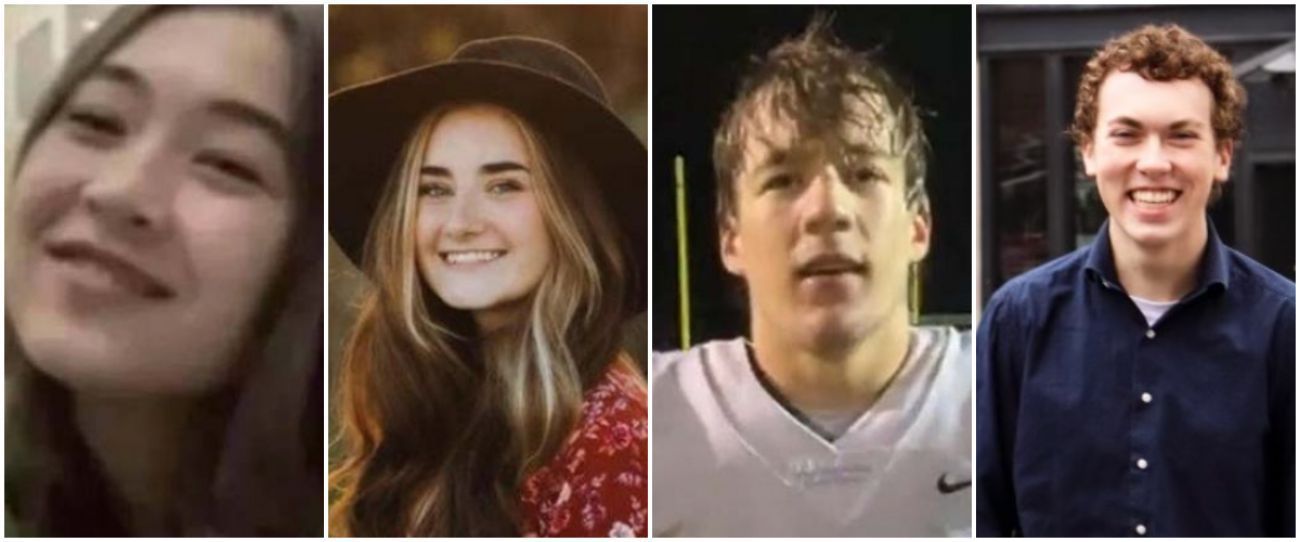Judge to sentence Oxford High School shooter Ethan Crumbley on Sept. 29

- A hearing concluded Friday to determine whether a life sentence is appropriate for Ethan Crumbley
- Judge will announce sentencing on Sept. 29
- Prosecutors also are charging Crumbley’s parents, arguing they failed to get him mental health
LANSING — Was the teenage Oxford High School shooter mentally ill when he opened fire on his classmates in late 2021?
That was the debate between prosecutors and Oxford shooter Ethan Crumbley’s lawyer Friday, and it could determine if the teen serves life in prison without the chance for parole.
Crumbley has pleaded guilty to killing Oxford High School classmates Hana St. Juliana, 14, Madisyn Baldwin, 17, Tate Myre, 16, and Justin Shilling, 17 and injuring seven others on Nov. 30, 2021.
Related:
- Judge to decide if teen Oxford shooter can be sentenced to life without parole
- Parents of Oxford shooter appeal to Supreme Court in bid to avoid trial
- New report provides safety recommendations for Oxford High after shooting
Crumbley, now 17, committed the shooting when he was 15 but was charged as an adult.
Oakland County Circuit Court Judge Kwamé L. Rowe, who presides over the case, announced Friday that he will decide on the sentencing Sept. 29.
Over the past month, prosecutors and defense attorneys have sparred over a so-called Miller hearing, which is used to determine if life sentences are appropriate for children.
Over numerous hours of testimony, prosecutors contended Crumbley was troubled but not mentally ill, since he understood the consequences but still pulled the trigger several times.
Instead, they contended the massacre was the culmination of planning that included mutilating birds, violent sketches, fantasies about killing children, research and a desire to live to see his victims suffer and be remembered for his act, prosecutors said.
“There was an execution of this plan. There were opportunities to stop. There was a picking and choosing who would die,” Oakland County Prosecutor Karen McDonald said during closing arguments Friday.
Crumbley’s attorney, public defender Paulette Loftin, contends the teen has a mental illness, lived in a dysfunctional family that largely ignored his mental health and is not a juvenile “without the ability to be rehabilitated.”
“Ethan was overlooked,” she said Friday. “Ethan in his own way crying out for help still went unnoticed.”
Expert witnesses on both sides clashed over Crumbley’s mental health over the past weeks — a crucial factor that could help decide if he deserves a life in prison without parole.
Psychologist Colin King, who testified earlier this month on behalf of the defense, called Crumbley “a broken person with a broken brain.” Video footage shown during that hearing revealed Crumbley crying in jail in May, blaming God for not stopping the shooting repeatedly.
King, who earned his doctorate from Wayne State University in Detroit, argued during Crumbley was hallucinating and experiencing a “psychosis,” a break from reality during the shootings — and is now “expressing extreme sorrow.”
But Lisa Anacker, a forensics psychiatrist associated with the Center for Forensic Psychiatry in Ann Arbor, countered the claim Friday. She had found Crumbley not mentally ill in a report after examining him, The Detroit Free Press reported.
Psychotic people tend to act impulsively when “overwhelmed with mental illness,” Anacker said Friday. But Crumbley planned and waited for the shooting to happen, demonstrating an “ability to delay things.”
“He could have just done it all at once, the first time, if he just couldn’t wait because he was so overcome with delusions and hallucinations,” she argued. “That’s not what happened.”
Dual cases, a contradiction?
Prosecutors are arguing that Crumbley does not meet the legal definition of insanity at the same time they are pursuing a separate involuntary manslaughter case against his parents, James and Jennifer Crumbley, on allegations they failed to get the teen mental health help that could have prevented the shooting.
Instead, they bought Ethan Crumbley the gun he used to kill classmates.
“These parents knew he had reported hallucinations … (and) had asked to go to the doctor … They did nothing,” prosecutors argued in that case.
But in a hearing last week in the shooter’s case, Assistant Oakland County Prosecutor David Williams argued that the reason Ethan Crumbley did not receive help from others was because "he doesn’t ask for help” — the exact argument presented by the parents’ defenders.
Loftin, Crumbley’s public defender, used the discrepancy against prosecutors Friday.
“You can’t stand in two different courtrooms and argue two different things, but it’s one set of facts,” Loftin said Friday.
Former federal prosecutor Mark Chutkow told Bridge Michigan on Friday that prosecutors need to be careful not to appear inconsistent.
What the prosecutors are arguing, he said, is that the warning signs Crumbley displayed should have alarmed the parents “even if he was not clinically insane.”
The defense faces a similar challenge, Chutkow said.
Last year, Loftin filed a notice of insanity on behalf of Crumbley but later withdrew it, instead letting Crumbley plead guilty on all counts against him.
But the defender on Friday argued that Crumbley’s psychiatric needs were long ignored.
“It was glaringly obvious that he was not OK,” Loftin said. “His parents took a disturbed, mentally challenged and possibly ill kid — their son — and what did they do? They didn’t take him to a doctor. They didn’t take them home. They didn’t walk into that room and say ‘I love you. I’ll do anything for you.’
“You know what they did? They bought him a weapon.”
Extenuating factors?
Chutkow said the defense would have had to meet a high bar to prove insanity, which is possibly why Crumbley’s defender later withdrew it. But the defense could still argue his mental health issues should keep Crumbley from serving life behind bars without parole, he said.
To plead insanity, the shooter must be proven to be “unable to understand the nature and quality of his actions or distinguish right from wrong as a result of a severe mental disorder or defect,” Chutkow said.
The judge will look at Crumbley’s age, family life, culpability, mental health issues and the severity of the crime to determine his sentencing, rather than potential inconsistencies, Chutkow said.
“The (judge) has to make the decision him or herself based on the evidence,” he said. “The court is not going to play a game of gotcha as to whether the government has been perfectly consistent or not.”
See what new members are saying about why they donated to Bridge Michigan:
- “In order for this information to be accurate and unbiased it must be underwritten by its readers, not by special interests.” - Larry S.
- “Not many other media sources report on the topics Bridge does.” - Susan B.
- “Your journalism is outstanding and rare these days.” - Mark S.
If you want to ensure the future of nonpartisan, nonprofit Michigan journalism, please become a member today. You, too, will be asked why you donated and maybe we'll feature your quote next time!




